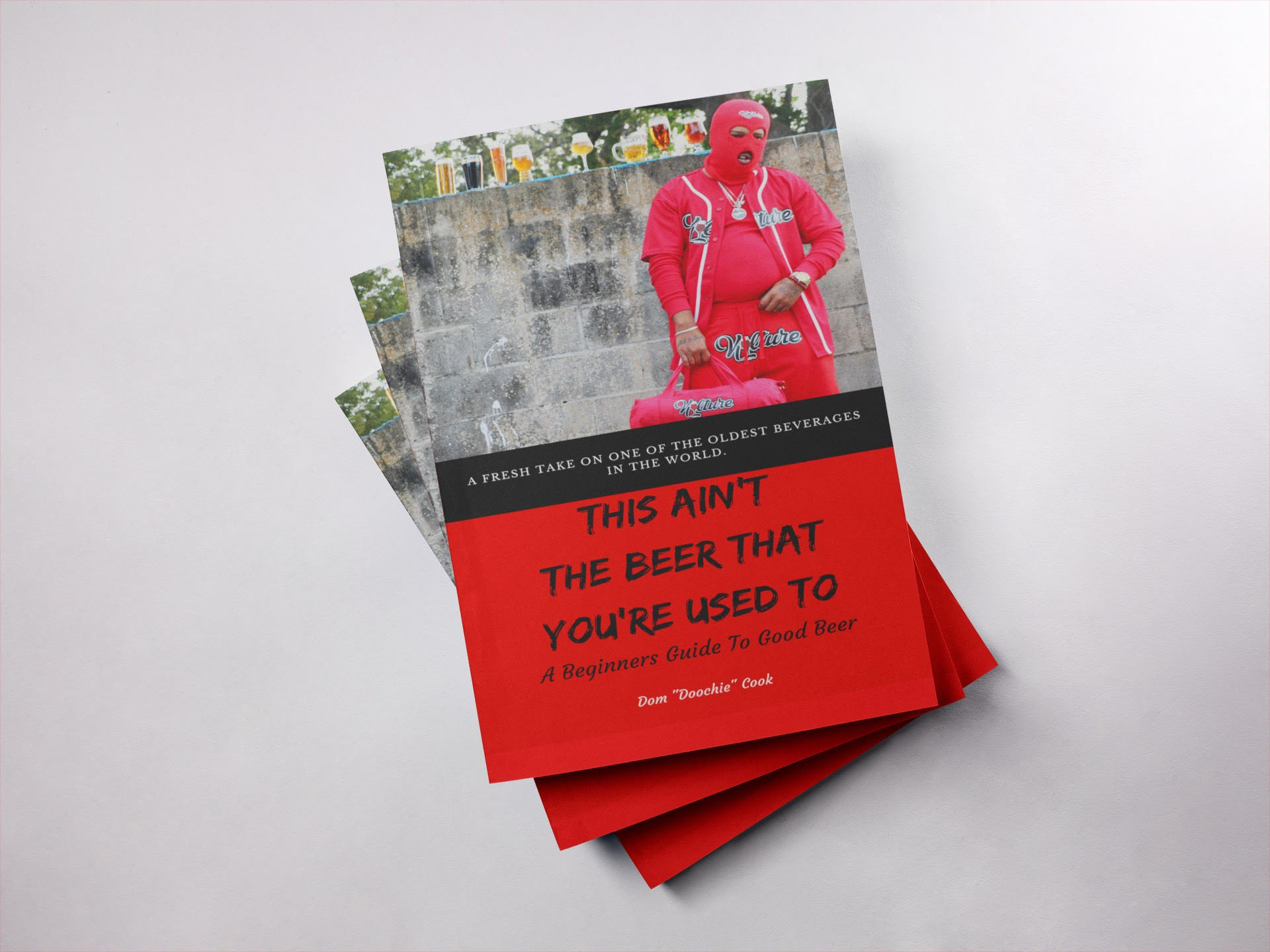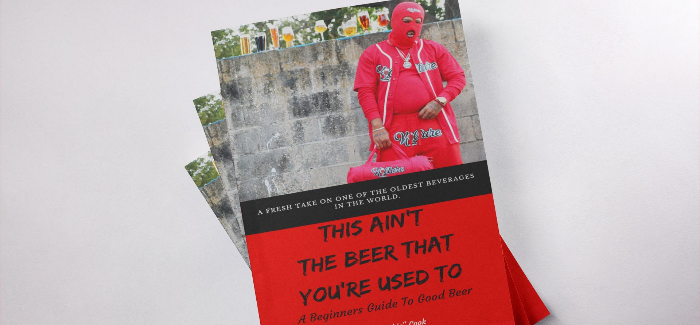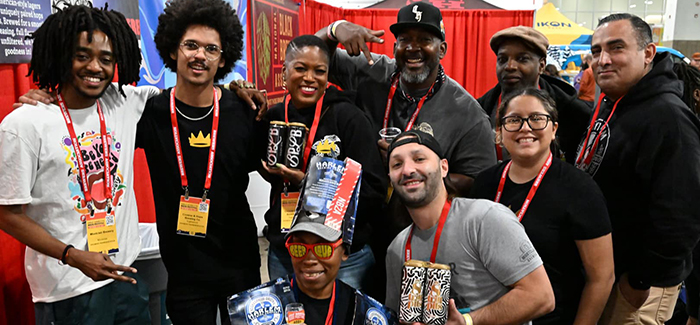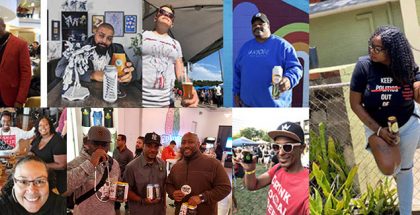This Ain’t the Beer that You’re Used To—An Interview with Dom Cook
“I didn’t write it for people who are into beer. I wrote it for a specific demographic of people who didn’t know anything about beer.”
That’s Dom “Doochie” Cook, founder of Beer Kulture, talking about his new book, This Ain’t the Beer that You’re Used To: A Beginner’s Guide to Good Beer. The book is intended to be an introduction not just for newcomers to craft beer, but for racial and ethnic demographics that for the most part haven’t had good beer marketed to them. The book is finding an audience with established beer fans as well though, providing a new perspective on an industry that has too long been dominated by white voices.
“I was shocked to see so many people who are well beyond the novice stage of beer enjoy it as much as they have,” says Cook, who is a Certified Cicerone. He’s still focusing on his target audience though.
“The people I wrote it for specifically are enjoying the fuck out of it as well.”
Cook hopes the book will introduce new populations to good beer. He’s tired of craft beer not being marketed or sold in predominantly non-white neighborhoods, and has begun selling copies of This Ain’t the Beer that You’re Used To in corner stores and bodegas around the Tampa Bay area he calls home, as well as in other cities he and the Beer Kulture team visit.
“The response in those neighborhoods is shock,” he explains. “A lot of these people have never heard of good beer. For a long time we’ve tried to get sales reps to bring good beer into these stores and advertise, but they’re stuck in their old dinosaur way of thinking. So we’ll put the book in these stores.”

The 85-page book provides simple beer style descriptions, and avoids technical language and insider terminology from the beer industry that can be intimidating to complete newcomers.
“I think a lot of beginner guides are not true beginner guides. A lot of stuff is just too advanced for someone who doesn’t know a thing about beer,” says Cook. “I wanted to really break it down as simple as possible. I wanted to do it in a way that they can understand it the way they talk, the way they conversate.”
For example, this is how Cook describes Hefeweizen in his book:
“A well respected but overlooked beer style that’s been around for ages. Hefeweizen (also known as Weisse or Weizen) is a German beer with a rich history. This is the wheat beer of wheat beers — golden color with a haziness that keeps you from seeing straight through. This beer sits between 4.3-5.6% and is a highly carbonated, highly refreshing beer with low bitterness. Fluffy, creamy mouthfeel, this is a beer to be enjoyed outside on a beautiful day. Although we taste the bready notes from the wheat, the yeast is the star of the show here. Bananas and cloves wrapped in a beautiful display, even bubble gum and vanilla have been known to make appearances.”
What more do you really need to know to appreciation Hefeweizen? These simple, straight-forward descriptions take what can be an overwhelming variety of beer styles and make those styles approachable to absolutely anyone. But while anyone can enjoy craft beer styles, Cook says a major obstacle up till now that has largely kept people of color from getting into good beer is simply that it hasn’t been marketed to them or presented to them as something of worth.
“There’s always been an excuse I’ve heard that these people won’t like beer, or these people won’t buy beer,” explains Cook. “I tell people all the time, anybody, no matter who you are or where you from, we buy what we value. Not only do the urban demographic not know about beer, they don’t value beer, because what they do know about beer—malt liquor, Heineken, Corona—is nothing for them to value. I added in the parts of my story [in the book] to show you why I value this.”
The first chapter of This Ain’t the Beer that You’re Used To tells Cook’s story, all the way from getting drunk on shitty malt liquor as a teenager in the Bronx to discovering good beer in his late twenties. This section not only demonstrates to Cook’s target demographic how he came to value good beer, as he explains above, but also opens eyes among white craft beer fans of the different paths that bring people to the world of craft beer, and why that world is stronger and more beautiful when it includes diverse stories and voices.
While his book has started some fresh conversations in the craft beer world, Cook is more focused on seeing actual change rather than words.
“Beer Kulture started in 2017. I’d been working in the beer industry, talking to people, bringing up the importance of diversity and inclusion, bringing up the importance of people being who they are,” explains Cook. “It’s not an issue with white people in the industry. It tends to be people of other ethnicities and races to be able to be who they are 100% and be accepted for that. I was talking about that for years, and it was falling on deaf ears. After too many conversations, I was like fuck it. Let me do what I can do.”
Cook and the Beer Kulture crew have largely been bypassing conventional craft beer marketing and journalism and interacting directly with their target communities to spread the word of good beer.
“What I want to see moving in the next couple years is the industry doing shit differently,” reflects Cook. “One side of what we do at Beer Kulture is we want to see the industry reaching out to new groups of people right where they are and in the way that they communicate. As people are being exposed to it and start to value it, people decide like I did that hey, we want to work in the beer industry, so on the flip side, the beer industry starts to deal with them differently. It’s no longer that you have to be or look or dress a certain way. That’s what we push and what we work for.”
Cook argues that in addition to the need for breweries to care about diversity and inclusion, they should also be reaching out to new demographics for business reasons.
“Especially with the beer industry’s growth slowing down as it has been, there’s the importance of reaching out to new demographics and bringing new faces in,” observes Cook. “You’ve got thousands of new breweries opening every year, but not new consumers. Every business wants to grow, right?”
Breweries have already begun approaching Cook and the Beer Kulture team about how to reach urban demographics in a sincere way that doesn’t smack of appropriation or exploitation.
“That’s why you have groups like Beer Kulture that you tap into. It’s definitely not something I would encourage these breweries to go do on they own,” says Cook. “Most of these breweries have no fucking clue what they’re doing, honestly.”
Additionally, he says appropriation would hardly be a new concern when it comes to craft breweries.
“At the end of the day, appropriation and all that shit is going on in the beer industry now. You got tons of breweries that are making cans with Tupac and Biggie on it. You got all kinds of places using the latest rap lyrics or whatever, but you walk into their taprooms and there’s no diversity on either side of the bar. That’s the shit we want to change. We want to see diversity on both sides of the bar. You have to tap into people who are already tapped in, already plugged in, feet on the ground, you know what I’m saying? You tap into the right people like Beer Kulture, we’re going to make sure what you’re doing is done the right way, and it’s not just being done on some patronizing shit. It would have to be authentic.”

Through education, events, social media, and now This Ain’t the Beer that You’re Used To, Dom Cook and Beer Kulture are bringing good beer to urban beer deserts wherever they find them. Cook is tired of talking about how to do it, so his team is doing it themselves.
“There’s a time to talk and there’s a time for action, and the time to talk is over. It’s been over. People still want to talk. It’s about action from here on out.”
You can order a copy of This Ain’t the Beer that You’re Used To from the Beer Kulture website.








Submit a Comment